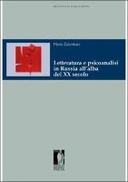Explore

Letteratura e psicoanalisi in Russia all’alba del XX secolo
Maria Zalambani
2022
0 Ungluers have
Faved this Work
Login to Fave
Psychoanalysis spread earlier and faster in Russia than in Western Europe. According to the author, there are three main reasons for this. First, psychoanalysis is based on the fictional structure of patients’s narratives. In a literary-centric country such as Russia, the ‘literary character’ of psychoanalysis quickly attracts the Russian intelligentsia. Secondly, the formal similarities between literary and psychoanalytic language, and the close connection between the poetic word and the rhetoric of the unconscious, contribute to rendering Freudian language particularly familiar in Russia. Thirdly, the Silver Age, with its attention to the symbol, the ‘other’, and the double, contributes to increasing interest in the theory of the unconscious. This will continue until after the October Revolution as the state relies on psychoanalysis to help forge the new Soviet citizen. This ‘alliance’, however, is short-lived, and Freudian psychoanalytic theory will be ostracized from the 1930s up to the end of the Soviet regime.
This book is included in DOAB.
Why read this book? Have your say.
You must be logged in to comment.
Rights Information
Are you the author or publisher of this work? If so, you can claim it as yours by registering as an Unglue.it rights holder.Downloads
This work has been downloaded 73 times via unglue.it ebook links.
- 73 - pdf (CC BY) at OAPEN Library.
Keywords
- history of Russian psychoanalysis
- Language
- Linguistics
- Literature & literary studies
- Literature: history & criticism
- Psychoanalysis
- Russian literature
- Silver age
- Soviet Union
- thema EDItEUR::C Language and Linguistics::CF Linguistics
- thema EDItEUR::D Biography, Literature and Literary studies::D Biography, Literature and Literary studies::DS Literature: history and criticism
Links
DOI: 10.36253/978-88-5518-547-9Editions

